Money shifting, excuses, head-scratching questions: The story behind CRC's fall
One more week, Tina Paradiso reportedly said. Give me one more week.
It was Jan. 26. Paradiso's non-profit, the Community Resource Collaborative, was supposed to be reimbursing a dozen other non-profits for expenses incurred while working on a major federal anti-poverty grant. Monroe County had released the money to CRC, but for some reason CRC didn't seem to have it.
Next Friday, Paradiso reportedly said. Come to the office Feb. 2 and pick up your checks.
When the moment arrived, the story changed: No need to come in person. I'll bring the money to the bank and they'll wire it.
"I said, 'No, I'll see you there,'" said Olivia Kassoum-Amadou, executive director of Cameron Community Ministries. She actually was waiting on two checks, one for her October invoice and one for November.
As Kassoum-Amadou pulled up to the CRC office on College Avenue, she saw one of the agency's black Jeep Grand Wagoneers. The Grand Wagoneers — two of them — had always seemed suspicious. What was a plucky social justice non-profit, almost entirely grant-funded, doing with a pair of luxury SUVs?
But that concern would have to wait. Kassoum-Amadou and two other agency leaders had arrived for their money. If they didn't get it, they risked missing payroll.
They went inside. Paradiso was nowhere to be found, and no one else inside had any idea where the checks were. Someone called CRC Chief Executive Officer Anthony Hall. He arrived but didn't know where the checks were either.
Tempers flared. Rochester's most admirable experiment in collaborative decentralized social services was beginning to feel like a scene from "Pulp Fiction."
Hall apologized and said he didn't understand what was happening. He promised to bring checks that weekend, and after a delay he did.
"In more than 30 years that I’ve been in non-profits, I have never, ever had to do anything like that," Kassoum-Amadou said.
"It just came to a head. We wanted some answers to our questions and we were told everything would be resolved. But it was always excuses and some ridiculous reason we couldn’t get our money."
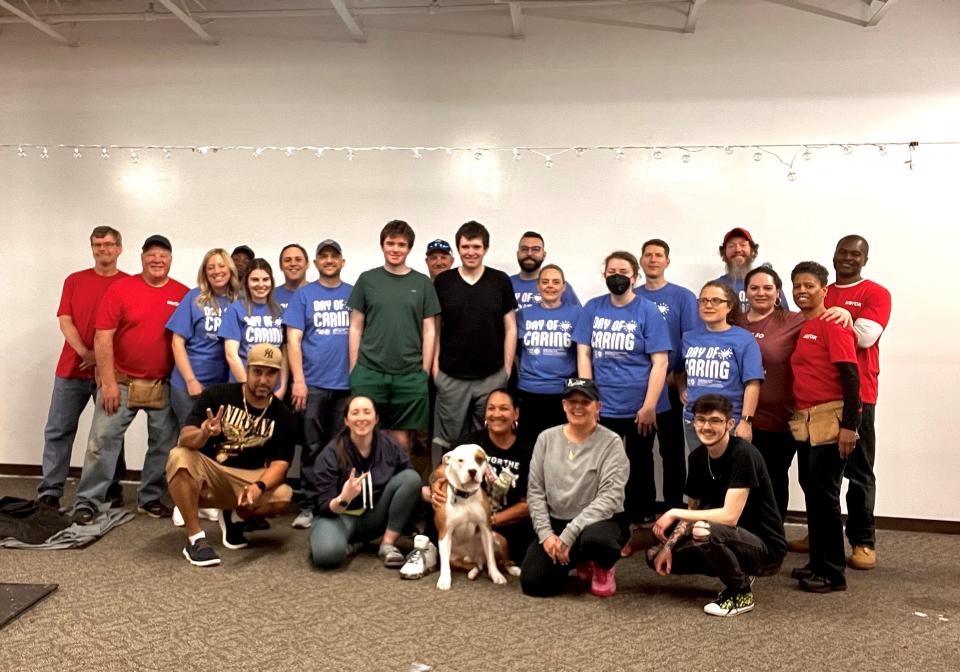
Lack of internal and external controls proves fatal
The Neighborhood Collaborative Project was supposed to be groundbreaking. Twelve agencies working together with a single mission. A 13th, CRC, would handle the money, freeing administrative capacity elsewhere.
Resources would reach those in need faster. Long-forged relationships would allow an unprecedented reach into neighborhoods throughout the city. For once, funding wasn't supposed to be an issue.
Today the project is in shambles. CRC is shuttered and hundreds of thousands of dollars are missing. The 12 member groups are limping along, continuing their work as best they can until a public or philanthropic lifeline can be arranged.
What happened?
This story is based on interviews with more than 20 people close to CRC, including former employees and leaders of organizations that contracted with it. The Democrat and Chronicle obtained legal filings, property records and grant applications as well as internal documents, including CRC's 2023 budget.
Paradiso referred a request for comment to her attorney, Steve Feder.
"We’re working with the county’s auditors and you’ll hear when they finish their work," Feder said. "The facts are nowhere near what’s represented in the press. You’re not even close. That’s all I’ll tell you."
Together, the existing evidence points toward an immature and unstructured organization that struggled to account for its own money, much less $7 million in funds intended for a dozen other organizations. At the helm was Paradiso, an enthusiastic networker with an apparent passion for social justice and enough charisma to explain away any minor missteps, at least initially.
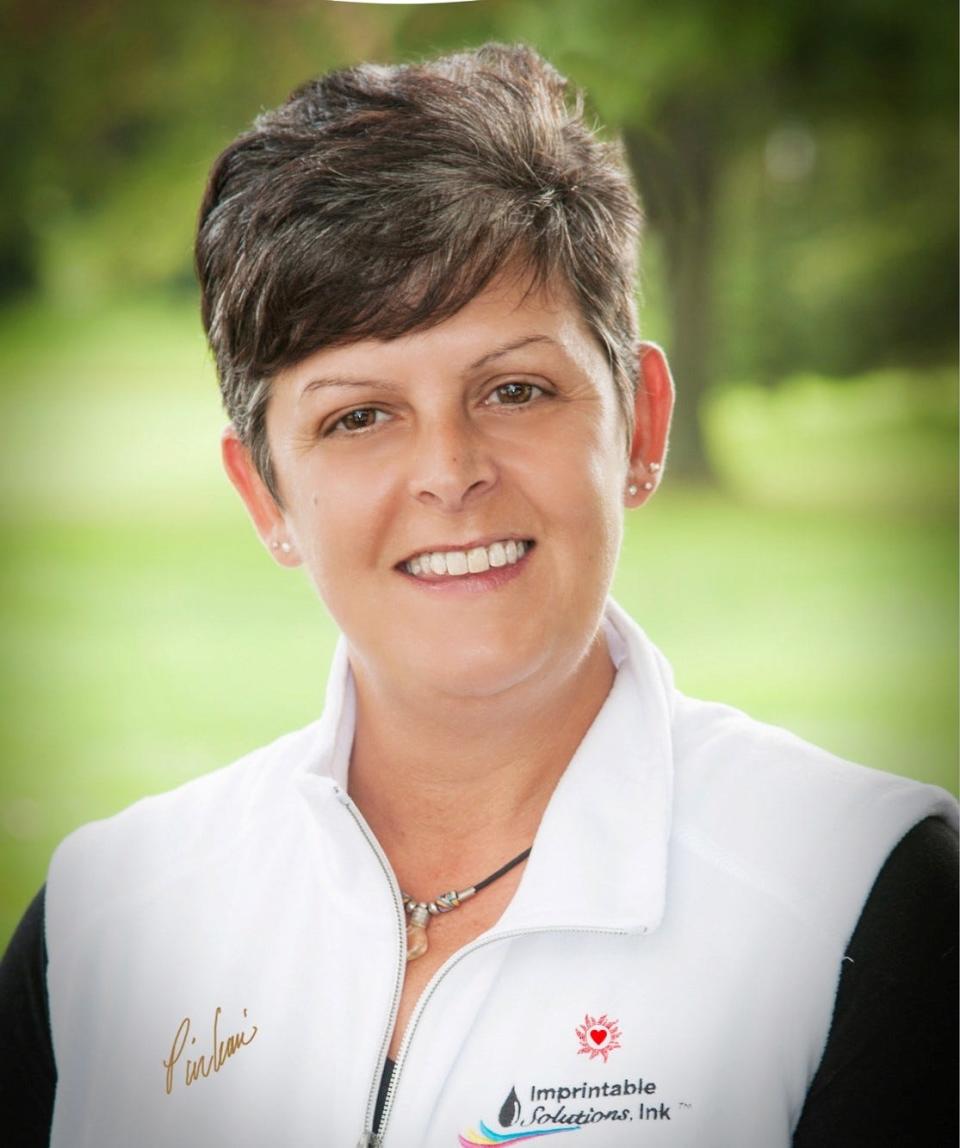
By the end of 2023 the group's missteps had formed a mountain, but Paradiso tried to maintain business as usual. She scrambled to come up with cash, including by borrowing large sums from two downstate lenders in exchange for future receivables, an apparent Hail Mary attempt that mixed her business and non-profit finances. But bills began to go unpaid and checks began to bounce, first within CRC and then beyond.
Paradiso at that point was technically under the supervision of Anthony Hall, a well known and respected anti-violence activist who'd been hired as CEO in August. People who worked with CRC during that period said Hall failed to appreciate the trouble brewing in the organization he headed.
Paradiso remained the sole point of contact for CRC's problematic fiscal agency services and the keeper of the books, to the extent they were kept at all. Even though the two leaders had their desks side by side in a shared office, Hall apparently had little understanding of the mounting troubles until the day he finally fired her.
"It always seemed like the power and control lay with Tina, not Anthony," said Krystal Schulik, CRC's former director of social services.
Hall's role is one major unanswered question. He declined to comment for this story. In a public roundtable conversation Tuesday with the Black Agenda Group, he acknowledged that he should've been "more engaged" in CRC's financial and structural controls.
"It seemed like folks didn’t really, structure-wise, adhere to the fact I was the CEO," he said. "If problems occurred, I should’ve been alerted, and I didn’t assert that as much as I needed to."
Another question is why Monroe County awarded such a significant grant to a fiscal agent with extremely little experience in grant management. The county recognized CRC as "high-risk" at the onset and determined the organization would be subjected to especially intensive monitoring, but its efforts clearly did not suffice.
Langston McFadden, the attorney conducting CRC's own internal investigation, did not respond to a request for comment.
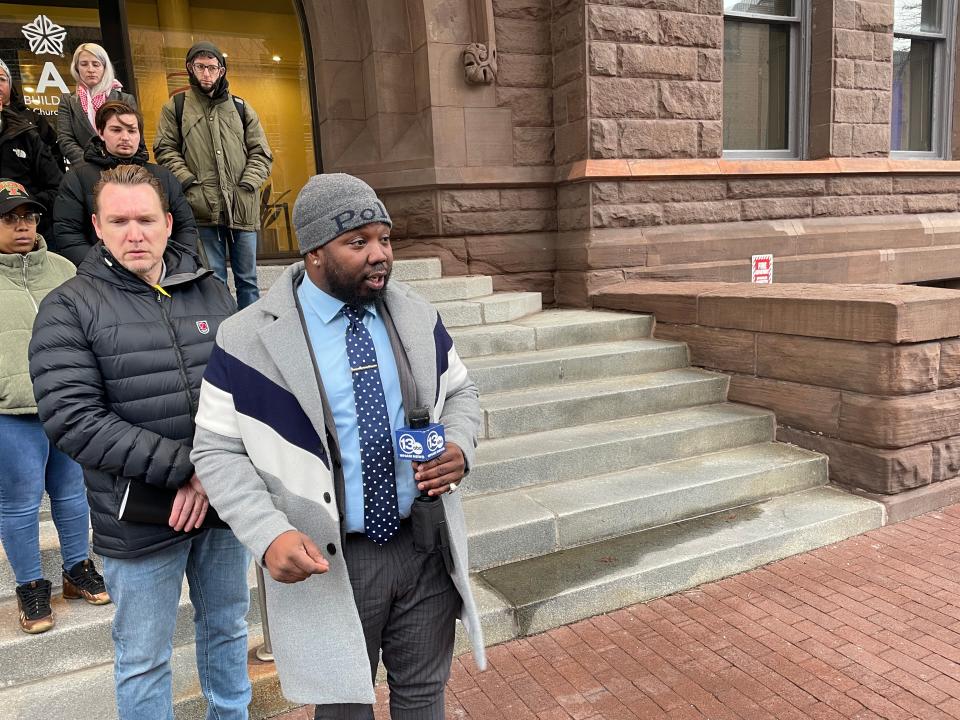
For Paradiso, CRC's downfall marks a milestone of sorts in a vertiginous career arc. She formed the organization in 2021 and in two short years received significant acclaim for her social justice efforts.
"Once a mere business owner, I’ve quickly evolved into a conscious leader and learned how quickly evolution can happen," she said in a November 2021 speech. "Blink. That’s how fast things change. Instantly."
Neighborhood Collaborative born out of necessity
The Neighborhood Collaborative Project began from necessity in the summer of 2020, when it was apparent that COVID-19 was preventing Rochester's most vulnerable residents from receiving the resources they needed.
A group of volunteers began walking the streets passing out supplies, then set up a pop-up outreach center at Jefferson Street and Frost Avenue in 2021.
"It really just started with walking and talking," said MC Collaborative co-founder Andy Carey. "There’d been so much centralization of social services for so long and everything was just sucked out of the neighborhoods."
The loose collective began to attract more members and coalesced into a semi-formal federation of organizations committed to decentralized services, direct outreach and wraparound care with low barriers.
The federal American Rescue Plan Act provided a major opportunity to grow and formalize their work. In May 2023, NCP was awarded $7.2 million, the largest grant given in Monroe County. Monroe County Executive Adam Bello, Rochester Mayor Malik Evans and U.S. Rep. Joe Morelle all attended a press conference at Cameron Community Ministries celebrating the award.
"I believe this project will truly be transformational," Bello said then. "This is a tremendous community effort. ... We are changing the face of services in our community."
Why was CRC chosen as the fiscal agent?
For a grant with so many sub-awardees, it was imperative that NCP designate a fiscal agent who could accept the money from the county and pass it on to everyone else in exchange for invoices.
Many of the member organizations were qualified to serve in that role and had done so in the past. But they decided from the beginning to choose an outside entity for two main reasons: to avoid disrupting the power dynamics among the 12 members, and to ensure the administrative burden of managing the grant didn't prove to be an obstacle.
Since launching CRC in 2021, Paradiso had been making a name for herself in grassroots non-profit circles by offering to serve as a fiscal agent on small grants for no fee. One of the agency leaders, Jocelyn Basley of C3 Consultancy Services, had met Paradiso around that time and arranged a meeting, other early members said.
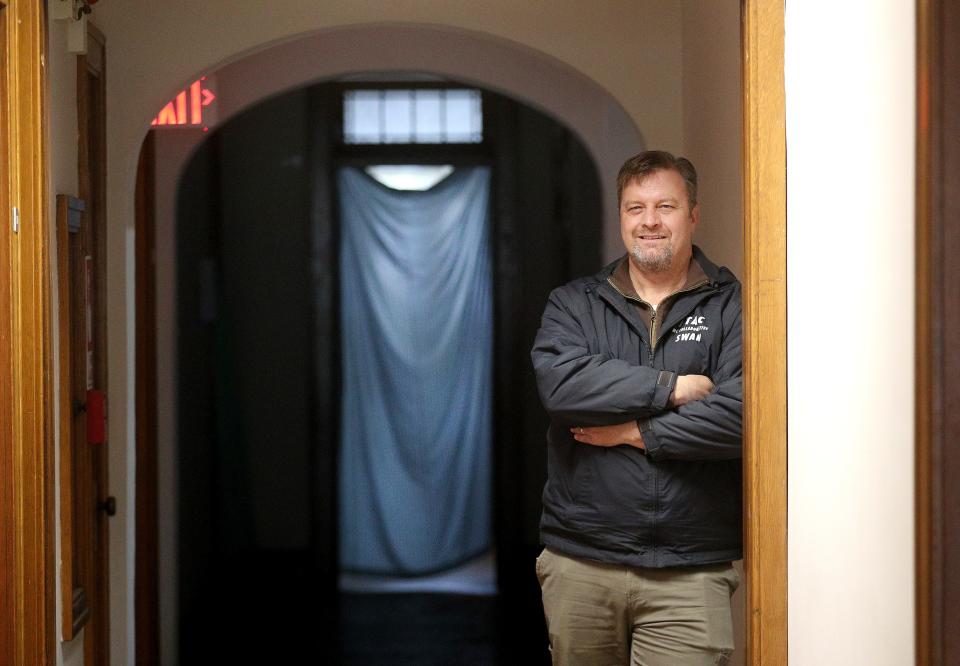
Basley would serve as an administrative liaison between NCP and CRC, collecting and checking invoices before CRC submitted them to the county. In August 2023 she joined CRC's board of directors. She did not respond to a request for comment.
"It looked fantastic on paper," Carey said. "(Paradiso) had gotten commendations from all these organizations, she was doing this important (anti-violence) work, and she was the fiduciary for a lot of other organizations."
Those other organizations were all very small grassroots entities with nothing close to the scale of a $7 million federal grant. But another part of the NCP concept was to build capacity within its members, said Janelle Duda-Banwar, founder of another partner entity, On The Ground Research. Providing a major opportunity to a small and new but seemingly promising non-profit seemed like a positive, not a negative.
It isn't clear how much experience CRC had as a fiscal agent. Its 2022 annual report shows no revenue from that work. In November 2022 it applied for a $375,000 grant from the state Department of Criminal Justice Services, but the grant wasn't awarded until February 2023.
Monroe County gave the NCP application 95 points out of 100 on its internal rubric when deciding how to distribute the federal money. That included a perfect score on whether "the applicant(s) demonstrates the administrative and fiscal capacity to implement the proposed project."
At the same time, though, the county evidently had some concerns in awarding the ARPA grant.
It designated CRC as a high-risk awardee, according to documents released in February. That meant it believed CRC might, among other things, "incur significant deficiencies in financial, regulatory, reporting, or other compliance requirements."
The high-risk designation meant the county's planning department had to justify the loan in writing, and the law department had to sign off on it. CRC would then be subject to a host of more stringent reporting requirements.
Monroe County spokesman Gary Walker listed a number of steps the county took to provide that more stringent reporting, including six financial reviews between June 2023 and January 2024.
He did not provide the rationale the county provided for signing off on the high-risk grant in the first place.
At beginning, flaws not apparent
The ARPA grant was awarded in May 2023. Things weren't perfect the first few months — but then again, they never are in grassroots work.
"When you’re starting a new venture, there’s a lot of grace given to people because we’re all figuring it out," Carey said. "We work in chaos all the time."
The payments were perhaps a week or so later than expected, but everyone knew that government funding streams can be slow. There was some confusion about paper checks versus direct deposit, but Paradiso said she was getting everything straightened out at the bank. All perfectly normal.
"With grassroots work, there’s going to be speedbumps and hiccups," Schulik said. "This isn’t an established organization with 500 employees and an HR department … it’s down in the dirt, gritty."
Within CRC itself, structural flaws were visible earlier. Diane Bardeen was hired in January 2023 as a grant writer and program developer but quickly saw her duties expand. She said in an interview that no one in the organization had a written job description, and that the details of specific grants seemed entirely unaligned with the way money got spent.
"I didn’t know what (money) there was for each grant; I didn’t know what was coming out for what purpose," she said. "I'd ask, 'How are we paying for this staff when they aren’t under a grant?' And (Paradiso) just said, 'We have other funding coming in.'"
Among those early expenditures, one big-ticket item stood out: a Jeep Grand Wagoneer purchased for $95,000 in March, according to reporting by WXXI News.
According to several CRC employees and also an internal budget document obtained by the Democrat and Chronicle, that Grand Wagoneer was purchased with a $50,000 grant that CRC received from Bank of America in early 2023.
Bank of America did not respond to a request for comment, but the budget document says the grant was for transportation. Barden said that when it came in, she immediately began researching 12- and 15-person vans to purchase, only to see Paradiso arrive in the Grand Wagoneer.
CRC had to rent buses that summer to transport its clients to field trips because they didn't have a large enough vehicle to do it themselves, Barden said.
Recommended: Why did video released by RPD omit 20 seconds after police shot a fleeing man?
A new CEO and a new Wagoneer
Several things happened in July and August that later proved momentous. Most notably, Paradiso moved into the chief operating officer role and hired Anthony Hall as CEO. In a press release, the organization called him "uniquely qualified to take the helm."
Hall was best known as director of Pathways to Peace, the city's street-level anti-violence initiative. He was well regarded for that work but had never led a non-profit organization.
"Anthony going into that role and thinking there was this person doing all these wonderful things for predominantly Black organizations — you kind of let your guard down a little bit," said Justin Morris, a friend of Hall's whose own non-profit, Untrapped Ministries, used CRC as a fiscal agent on several contracts. The most recent such arrangement, he said, ended in two dozen bounced checks.
"He went into this with great intentions, thinking he was finally going to get the respect he was due in this community as a CEO," Morris said. "(But) the deception was just too thick."

There were some immediate perks, though. A second Grand Wagoneer showed up for Hall to use. It is unclear where the money came from — or, for that matter, how Hall's salary was funded.
CRC's adopted $1.3 million budget for 2023 didn't include money for a CEO as well as a COO. And while an organizational budget is always subject to change, by mid-year CRC's revenue projections were riddled with holes.
A projected $375,000 from state Division of Criminal Justice Services grant only ended up paying $190,000 in 2023.
A program with the Greece Central School District was expected to bring in $122,000 in 2023. Instead it didn't even begin until January 2024, and CRC has not yet submitted an invoice for its work.
A grant from the city of Rochester to be part of the Peace Collective was budgeted for $138,000 in revenue, but city spokeswoman Barbara Pierce said the city paid out "less than $100,000."
A job-placement partnership with the Reentry Association of Western New York was supposed to bring in $65,000 but ended up paying a small fraction of that amount, RAWNY CEO Ann Graham said.
Then in September, Hall held a press conference attended by dignitaries including Greater Rochester Chamber of Commerce President Bob Duffy and state legislators Harry Bronson, Samra Brouk and Sarah Clark.
In an apparent surprise reveal, he said CRC had purchased a building at 1274 Dewey Ave., then handed an official-looking folder to Devon Reynolds, his close friend who leases space in that building for his barbershop and a clothing and food pantry.
Reynolds was also vice president of CRC's board of trustees, according to its 2022 annual report, and by September 2023 was an employee. He did not respond to requests for comment.
➧ From 2018: Barber believes he was born to help
The impression on the crowd at the press conference, and apparently on Reynolds, was that Hall was handing over the deed to the building.
In fact that never happened. Monroe County property records show that CRC bought the building for $168,000 on Aug. 24 and still owns it today.
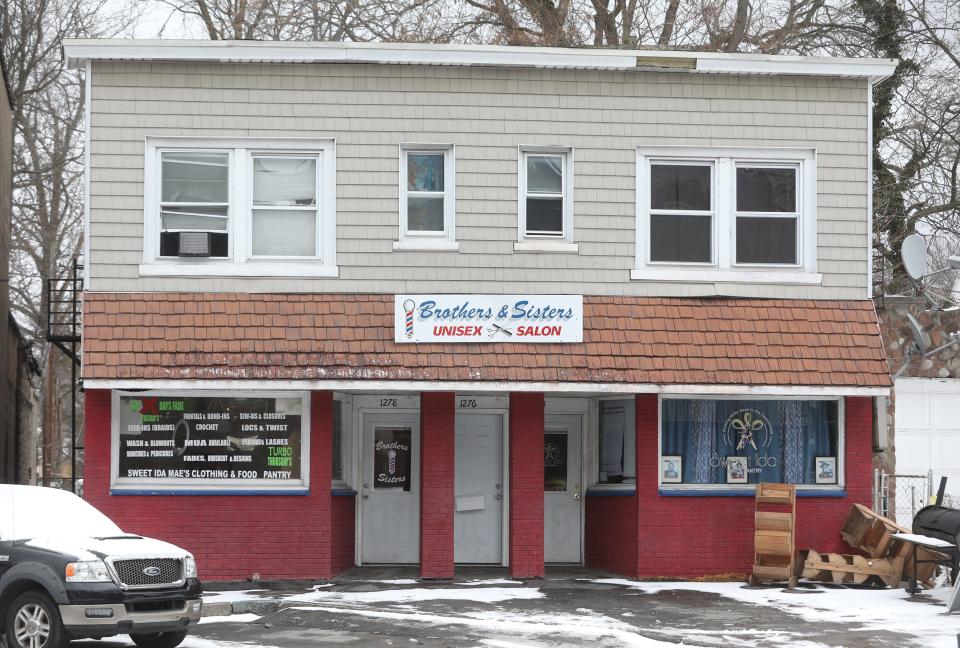
For the purposes of the NCP, Paradiso remained the point of contact. Several members said they never saw Hall or spoke with him until well into 2024.
Checks started to get later and excuses began to compound. Paradiso always had a plausible explanation.
"It was getting stressful," Duda-Banwar said. "It seemed disorganized; she seemed really overwhelmed. And that was the story she was telling us, crying. … She really was pulling at our humanity."
Learn More: Community Resource Collaborative financial crisis takes toll, impact grows
Frantic money-shifting, then a fall
If the first six months were turbulent, the last two were a flaming free fall.
For the NCP members, getting paid on their invoices became essentially a part-time job. They described texting, calling and emailing for days on end before Paradiso would respond, much less cut a check.
At a meeting in early January, Paradiso said she'd switched banks and was working to iron out disbursement issues. At another meeting Jan. 26 she said there was a limit to the amount of money she could send out via direct deposit on a given day.
Father Tracy Advocacy Center Executive Director Beatriz LeBron responded angrily, according to those who attended the Jan. 26 meeting, accusing her of hiding behind banking jargon.
"We were all very frustrated, we didn’t understand the hold-up and we wanted answers," Duda-Banwar said.
There was more going on behind the scenes that did not become public until later. First, in mid-December and then early January, Paradiso signed contracts with two separate downstate lenders, CFG Merchant Solutions and Silverline, separately promising each of them large sums of her printing company's future revenue in exchange for immediate cash in a fiscal maneuver known as factoring.
She promised Silverline $129,000 in future revenues in exchange for $86,000 up front, to be paid over several weeks. She promised CFG $51,000 in future revenues for an undisclosed sale price.
Paradiso signed those contracts on behalf of her printing company. But at the same time, Paradiso was going on a spree creating alternate legal business names for CRC. In a month she registered six of them, plus another associated with her business.
One such name, or doing-business-as, was Imprinting Lives, the name of an internship program within her for-profit company. Another was Neighborhood Collaborative Project. In other words, she sought to intermingle her company, her non-profit and the greater collaborative project to which it belonged.
No one in NCP knew about it.
Those loans became public in February when both lenders sued, saying Paradiso had failed to make payments or give them access to their funds.
The lawyer for the lenders, Jeffrey Zachter, did not respond to a request for comment. Neither did E. Adam Leyens, the attorney who filed the paperwork for the alternate business names.
Within CRC itself, invoices for printing supplies were going unpaid, Barden said, and the food cupboards were bare. Some work was still progressing. On Jan. 11, Hall signed a lease on the former Holy Apostles school building on Lyell Avenue, saying it would be the future home of "CRC's Community Intervention Center."
The real estate agent who brokered the lease, Rick Altier, said he thought that CRC was going to sublease space in the 33,000-square-foot building to other non-profit organizations. It was a five-year lease with monthly payments increasing over time, with little to no money due up front.
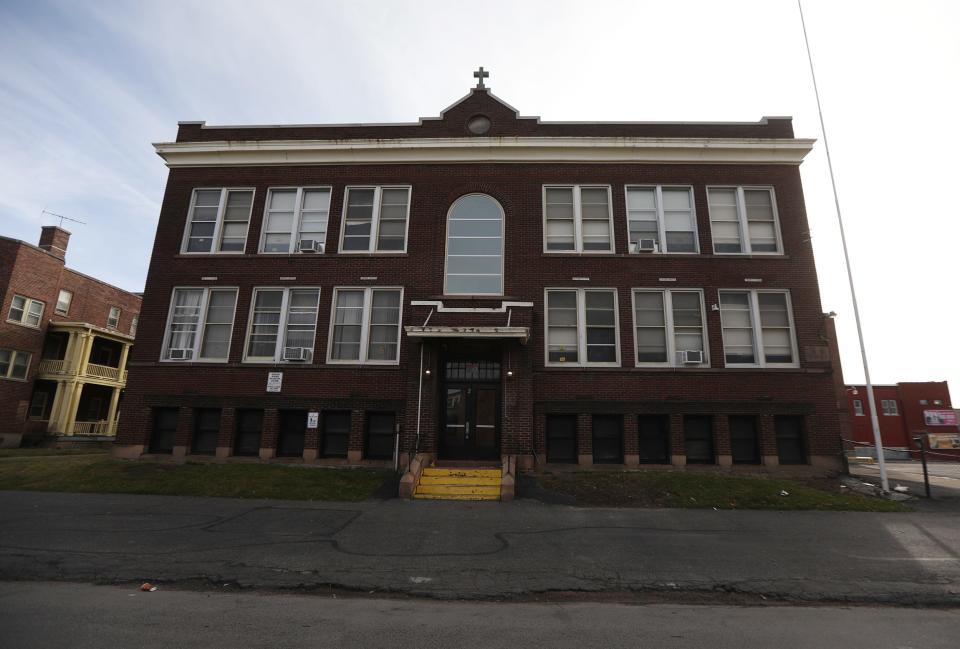
"It's a perfect building for what we thought was a perfect use," he said. "(But) they didn't move a single chair in or anything. Nothing has started yet."
The Jan. 26 meeting was the first time Hall appeared before the NCP leaders, several of them said. It was via Zoom, and he didn't speak at all.
Hall did try in early January to tighten some of CRC's internal fiscal controls. Notably, he stopped the practice of serving as a fiscal agent for no fee, the feature that had appealed to many small grassroots organizations.
On the day that the NCP leaders came to pick their checks up, though, he had nothing to tell them.
"I said to him, 'You mean to tell me you’re the CEO and you don’t know what’s going on here?'" Olivia Kassoum-Amadou said. "And he said he was sorry, and that he just found out what was going on."
She and others are waiting for Monroe County to select a new fiscal agent for NCP. They're continuing their work, hoping the funding eventually will follow.
"I don’t think anything has been lost yet," she said. "Initially the shock was a lot for all of us, and we had to regroup and set out to what we were supposed to do. ...
"There’s so many questions. … I don’t know if we’ll ever know the answers to everything."
— Justin Murphy is a veteran reporter at the Democrat and Chronicle and author of "Your Children Are Very Greatly in Danger: School Segregation in Rochester, New York." Follow him on Twitter at twitter.com/CitizenMurphy or contact him at jmurphy7@gannett.com.
This article originally appeared on Rochester Democrat and Chronicle: Community Resource Collaborative fall: Shifting money, many questions

